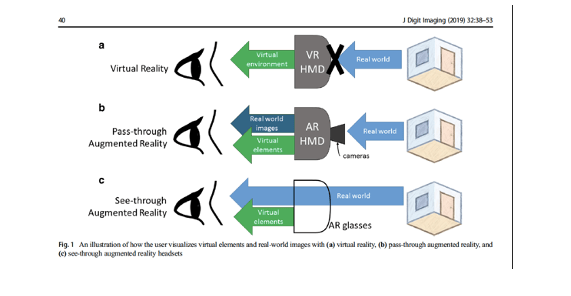Discussion on low-end AR (Metaverse)
- What is AR (how is it different from VR or MR)
https://blog.stcloudstate.edu/ims/2019/03/25/peter-rubin-future-presence/
p. 225
“augmented reality: Bringing artificial objects into the real world-these can be as simple as a ” heads-up display,” like a speedometer project it onto your car’s windshield, or as complex as seen to be virtual creature woke across your real world leaving room, casting a realistic shadow on the floor”
https://blog.stcloudstate.edu/ims/2018/11/07/can-xr-help-students-learn/
p. 12
Augmented reality provides an “overlay” of some type over the real world through
the use of a headset or even a smartphone.
There is no necessary distinction between AR and VR; indeed, much research
on the subject is based on a conception of a “virtuality continuum” from entirely
real to entirely virtual, where AR lies somewhere between those ends of the
spectrum. Paul Milgram and Fumio Kishino, “A Taxonomy of Mixed Reality Visual Displays,
https://blog.stcloudstate.edu/ims/2018/10/17/vr-ar-learning-materials/
Augmented reality superimposes a digital layer on the world around us, often activated by scanning a trigger image or via GPS (think Pokemon Go!). Virtual reality takes users away from the real world, fully immersing students in a digital experience that replaces reality. Mixed reality takes augmented a step further by allowing the digital and real worlds to interact and the digital components to change based on the user’s environment.
- Low-end and hi-end AR
- Hi-end: Hololens, Google Glass, Apple Glass
- Unity-driven content
- Unity-driven content
- Low-end: Metaverse
- Hi-end: Hololens, Google Glass, Apple Glass
- What is Metaverse
-
-
- Metaverse studio
https://studio.gometa.io/discover/me - Metaverse app
- Gamifying Library orientation using Metaverse:
https://mtvrs.io/GenerousJubilantEeve
(the gateway to the Library orientation project)
Metaverse experience through the user’s phone:
- Metaverse studio
-
- Student projects using Metaverse
https://im690group.weebly.com/
https://mtvrs.io/PreviousImpracticalNandu - Behind the scene, or how does it work
https://studio.gometa.io/discover/me/a0cc4490-85fb-41d8-849b-bf52ac3ecb70
YouTube materials:
https://youtu.be/jLRR6fKtfwY
https://youtu.be/MLeZo7X5rnA
https://youtu.be/g9kY41OcR0Y
-
- Discussion
- Low-end vs hi-end AR
- advantages
- disadvantages
- gamify learning content with Metaverse
https://youtu.be/2lUrs3mJSHg - Discuss the following statement:
“low-end AR (Metaverse), like low-end VR (360 degrees) has strong potential to introduce students, faculty and staff to immersive teaching and learning“
- Low-end vs hi-end AR
- Alternatives
++++++++++++++++
more on Metavere in this IMS blog
https://blog.stcloudstate.edu/ims?s=metaverse
